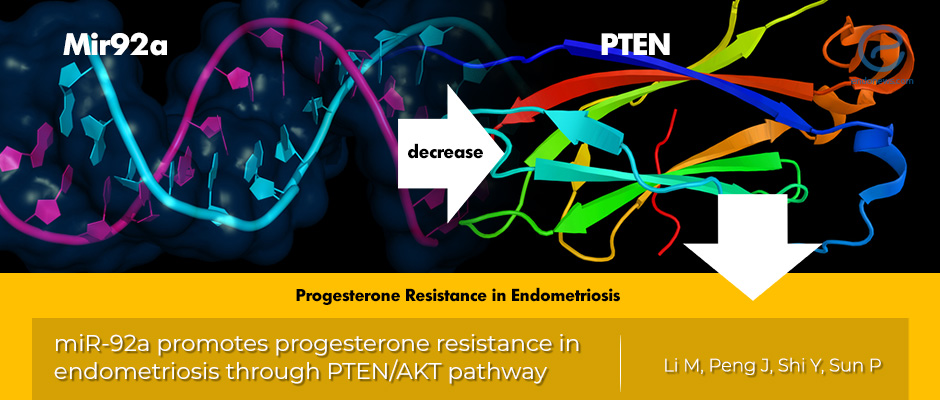miR-92a and progesterone resistance in endometriosis
May 18, 2020
Progesterone resistance in endometriosis may be restored by microRNA
Key Points
Highlight:
- Dr. Sun group revealed that miR-92a contributes to the development of progesterone resistant endometriosis through suppression of PTEN expression.
Background:
- The incidence of endometriosis is 35% to 50% among those who suffer from chronic pelvic pain and infertility, which has a negative effect on the quality of life and on health.
- PTEN is a tumor-suppressor gene and its functional inactivation is closely related to the endometrial diseases.
- In endometriosis, it was demonstrated that the AKT pathway, in the downstream of PTEN, is overactive in comparison with endometrial cells from endometriosis-free patients.
- However, the mechanism of PTEN protein inactivation in progestin treatment for endometriosis remains unclear.
- Therefore, Dr. Sun group from China hypothesizes low expression of PTEN protein might be associated with endometriosis, specifically for progesterone-resistance.
Key points:
- Both mRNA and protein levels of PTEN are decreased in the progesterone resistant group compared to the responsive group.
- The absence of PTEN contributes to progesterone resistance in the patient-derived cell line system.
- miR-92a level is highly correlated with downregulated PTEN in progesterone-resistant endometriosis; it reduces the PTEN level by targeting at the 3’-untranslated region.
- In the mouse experiment, the administration of miR-92a antagonists could restore not only PTEN level but also progesterone response in endometriosis.
Conclusions:
- miR-92a contributes to the development of progesterone resistant endometriosis by suppression of PTEN expression.
- The modulation of miR-92a might be a potential biological therapy in the treatment of endometriosis.
Lay Summary
Endometriosis is an estrogen-dependent disorder. This incidence of this disease is 35% to 50% among those who suffer from chronic pelvic pain and infertility, which has a negative effect on the quality of life and on health.
Recent genome-wide associations studies have revealed a strong connection between endometriosis and the 10q23–26 chromosome loci where PTEN is encoded. PTEN is a tumor-suppressor gene, and its functional inactivation is closely related to the endometrial diseases. In endometriosis, it was demonstrated that the AKT pathway, in the downstream of PTEN, is overactive in comparison with endometrial cells from endometriosis-free patients. However, the mechanism of PTEN protein inactivation in progestin treatment for endometriosis remains unclear.
Dr. Sun group from China hypothesizes that low expression of PTEN protein might be associated with endometriosis, specifically for progesterone-resistance. In this paper, this group found that miR-92a is responsible for the upstream regulation of PTEN and contributes to progesterone resistance in endometriosis. This paper was recently published in the journal “Life Sciences”.
Firstly, the authors examined the PTEN level in the progesterone-resistance group and compared it to the responsive group. Both mRNA and protein levels of PTEN is highly decreased in the resistant group. Using patient-derived cell lines, they found that the absence of PTEN contributed to progesterone resistance.
To understand how PTEN is downregulated in progesterone resistant endometriosis, PTEN targeting miRNAs were analyzed. Interestingly, the miR-92a level is highly correlated with downregulated PTEN in progesterone-resistant endometriosis. From functional studies, they reveal that miR-92a reduces the PTEN level in the cell via aiming at the 3’-untranslated region.
Next, they tested if inhibition of miR-92a actually increase PTEN level, and could restore progesterone resistance. To answer this question, they used a mouse model with endometriosis. From an in vivo experiment, the administration of miR-92a antagomir could restore not only PTEN level but also progesterone response in endometriosis.
In conclusion, miR-92a contributed to the development of progesterone resistant endometriosis by suppression of PTEN expression and its modulation might be a potential application of miRNAs as biological therapy in the treatment of endometriosis.
Research Source: https://www.ncbi.nlm.nih.gov/pubmed/31863773
Endometriosis miR-92a mRNA PTEN resistance progesterone

